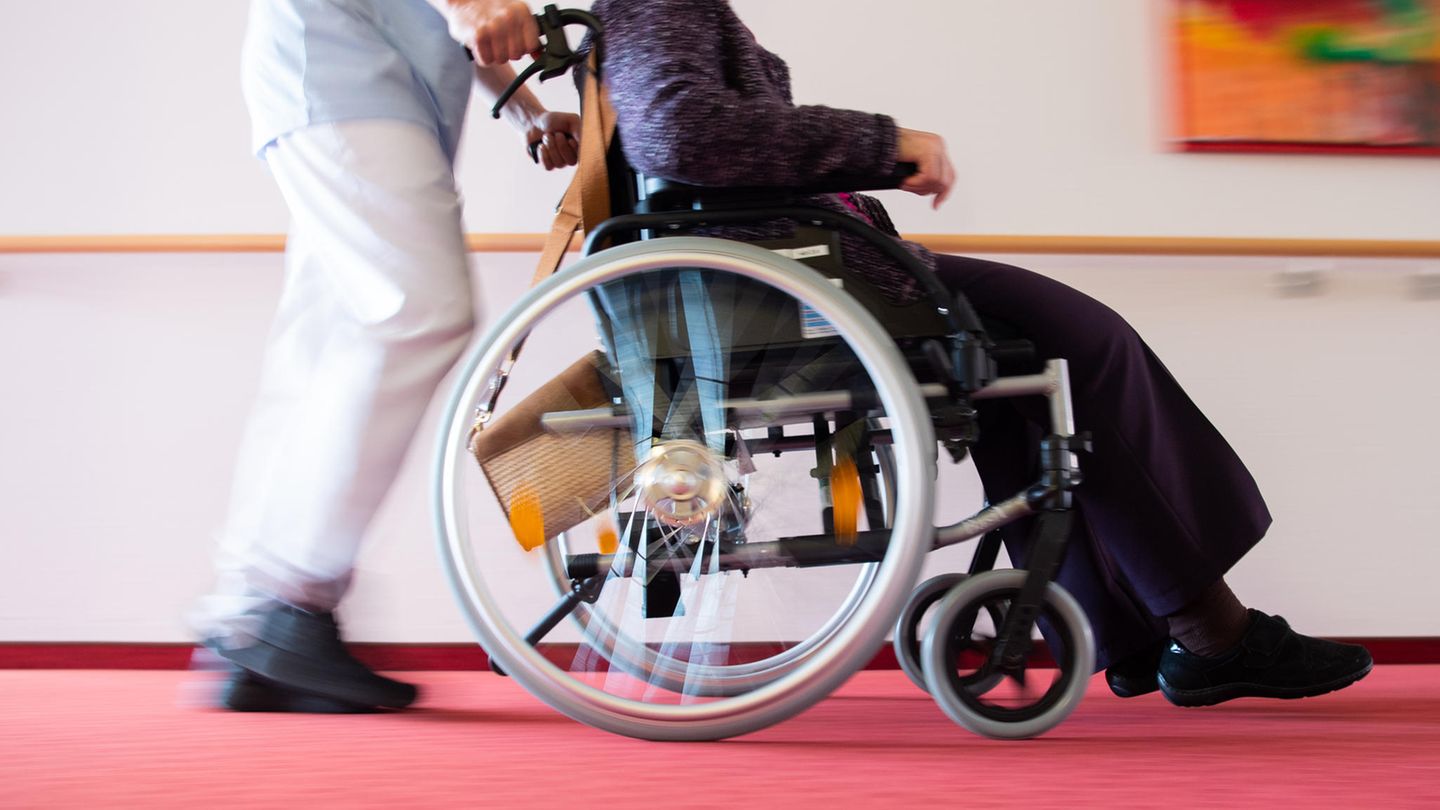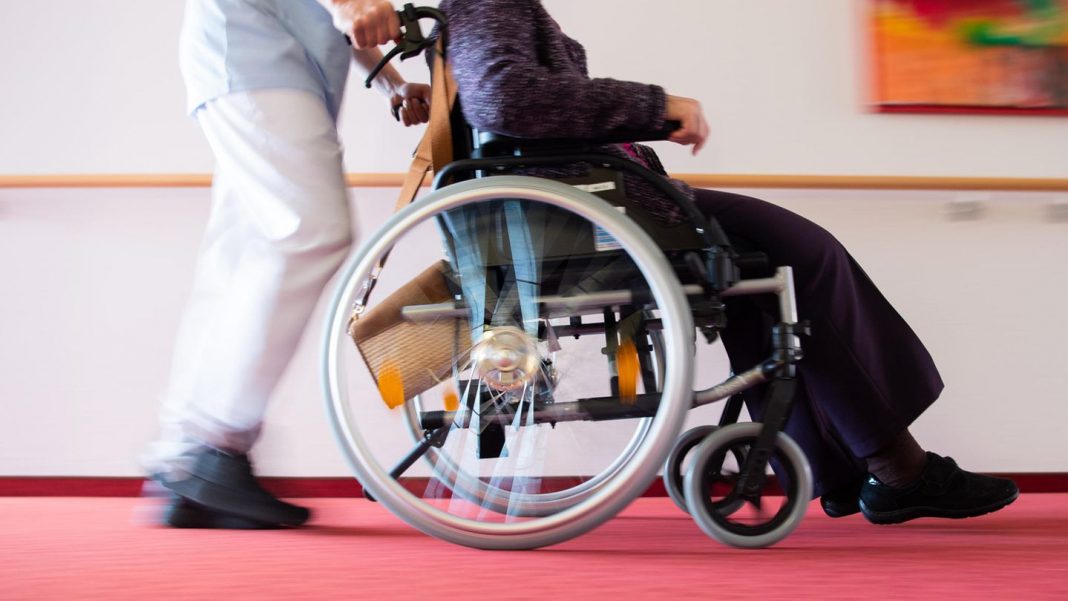Survey
Care Petition
Stop profiteering-how the Bundestag parties stand for the delusion of returns in elderly care

Yield-hungry investors are increasingly targeting nursing homes – how big is the awareness of the problem among the individual Bundestag parties?
© Tom Weller / DPA
Buy, trim for efficiency, sell-nursing homes are increasingly being targeted by the capital market. Not all parties see this as a problem.
International corporations and private equity investors are disrupting our healthcare system. Profits are particularly easy to achieve due to the stable macroeconomic situation, the risk is manageable – if there is nothing left to get from insurance companies, treatment and care recipients, the state will step in. At the end of 2019, more than one in 20 full-time inpatient nursing places was in the hands of such funders; in the particularly profitable out-of-hospital long-term intensive care ventilator patients, their market share was already a good third.
Private equity firms are trimming facilities to efficiency within a few years, which is achieved through further acquisitions, staff reductions and the centralisation of services. After a few years, the grown retirement home chain is then resold with rich profits-the so – called “buy-and-build strategy”. The profits often end up in tax havens. This is how money flows from our solidarity – funded health and social services, which would be urgently needed elsewhere.
Read here what the activities of major investors can mean for working conditions, quality of care and safety. This article is about what the Bundestag parties want to do against profit at any price – or not.
CDU / CSU
Shortly before the end of the parliamentary term, Jens Spahn brought the law for a “care reform” through the Bundestag. In the future, elderly care workers will be paid according to regional collective agreements, otherwise the institutions will not get a contract with the care funds. The additional costs should pay childless and taxpayers. However, investors ‘ profits remain untouched. The Federal Government also refers to the “subsidiarity principle” enshrined in law, which severely limits the role of the state in the care of the elderly. In the election programme published today, the two conservative parties put their trust entirely in non-profit and private operators, the special role of the strongly profit-oriented investors remains unmentioned: “We want to strengthen the diversity of care providers as an expression of a plural society. Here, too, we hope for better offers from the competition.”When asked about the investor activities, the health policy spokeswoman of the CDU/CSU parliamentary group Karin Maag adds:” In a social market economy, the state is not entitled to decide between permissible and inadmissible returns. In principle, I think this is also true for the care sector: I cannot say where a limit value for the return values would be quantified here, it cannot be regulated so simply.”However, profits should not be at the expense of the persons to be looked after or those working in care.
SPD
Labor Minister Hubertus Heil, who failed with his goal of a nationwide collective agreement for elderly care, has negotiated the minimal compromise of the care reform law as a coalition partner of the CDU/CSU. Otherwise, two years ago, the SPD called in a position paper to limit returns to make care more unattractive for investors. When asked by the office of health policy Martina Stamm-Fibich, it is said that legal consideration is currently being given to how the plan can be implemented. The position paper also states: “We want to repeal the current statutory priority rule for private persons in §11 SGB XI.”In an interview with the Tagesspiegel, the SPD health expert Karl Lauterbach explained that capital investors in the care sector must not only be stopped, but pushed back. “A large part of the care must be returned to municipal hands.”The election program also states:” Profits that are generated from funds of the solidarity community should be returned to the health system in a mandatory manner and as far as possible.”
AfD
For the AfD, the issue of investors does not appear in the election program. We asked the health policy spokesman Detlev Spangenberg. He opened his answer with this sentence: “The AfD stands for a market economy and not for a planned economy.”Profits are not fundamentally wrong, but the state must set the framework so that “not only investors benefit”. Otherwise, he calls for better controls. “Rules must be introduced and subsequently monitored by chambers, the medical service and other competent authorities at all levels of government in such a way that the pursuit of profit does not take place on the backs of patients and employees”.
The Left
The left calls in its provisional election program 2021, the legally enshrined right to profit must be deleted without replacement. Transnational care companies should be denied access to the German care market via a tax certificate in Germany, care institutions must work in the public interest. An interesting proposal, which had been discussed in the party, did not find its way into the program, says the answer letter of the care policy spokeswoman Pia Zimmermann: a legally prescribed “minimum holding period” for purchased nursing homes, in order to put a stop to the short-term interests of private equity investors.
FDP
In the election program of the FDP, the role of investors does not occur. When asked, the care policy spokeswoman Nicole Westig writes, she considers it important to distinguish between the many owner-managed private care companies and the large investors. “So far, the latter’s market share is expected to be around 5 percent. The FDP has no interest in this percentage increasing, and therefore considers it eminently important to strengthen the small and medium-sized care companies back.”

Alliance 90 / The Greens
The Greens advocate in their election program for a profound structural change in the care of the elderly, the “Quartierpflege”. The concept is based on models such as Denmark or the Netherlands. The municipalities are to carry out binding care demand planning themselves, neighbourhood, family and friend networks are to take responsibility for the elderly and those in need of care – guided and supported by particularly qualified care professionals. Older people can then stay in their own four walls for longer, which would meet their wishes on the one hand, and relieve the social security systems on the other hand, because inpatient care in homes is more expensive. When asked about the future role of investors, care policy spokeswoman Kordula Schulz-Asche writes that modern and innovative care concepts are also emerging in the private sector. The decisive question, however, is “whether and how companies whose main purpose is profit can ensure good care at all”.




